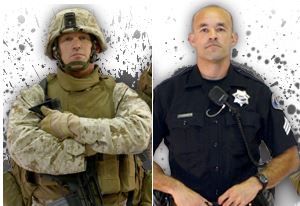
By Debbie Gregory.
Law enforcement officers and military veterans have a lot in common: both wear their uniforms with pride; both are a part of a larger team of professionals protecting those who can’t protect themselves; both put their personal safety at risk; and both operate within a rigid command structure. There is a natural path that leads many military veterans to seek government jobs for veterans, including jobs in law enforcement when they transition to the civilian workforce.
Some pre-planning can help close the deal after the interview process to secure law enforcement jobs for veterans.
The interview is where you get your sole opportunity to make a good first impression. Preparing your answers to commonly asked interview questions can make or break your chances of getting the law enforcement job you are hoping for.
Why do you want this job? Don’t answer that you think it would be a cool job. Draw on those similarities between military service and law enforcement: the service to those who can’t protect themselves, the camaraderie, and being part of a team.
What are your salary requirements? When it comes to compensation, don’t give an exact number. You should be familiar with the salary range, and you can say that you expect to be paid the appropriate range for this job, based on the location and your experience.
What is your biggest weakness? Focus on something that you have worked on to improve. For example, if your tactical driving skills were less than what you were happy with, share some of the details of the advanced driving course you took.
Tell Us About You. If you’re asked to tell your interviewer about who you are, resist the temptation to give a chronology of your adult life. Instead, focus on your life experiences as they pertain to the job.
Why should you be hired? Again, call on your military service, stressing that you are a physically and mentally fit candidate. You have good decision-making abilities, common sense, and respect a paramilitary chain of command.
Why are you leaving your current job? If you’re transitioning out of the military, this is an easy question to answer. Remember, if you’re a veteran, you shouldn’t badmouth a previous boss. If you had one that was particularly challenging, focus on what you learned from that person.
Military Connection salutes and proudly serves veterans and service members in the Army, Navy, Air Force, Marines, Coast Guard, Guard and Reserve, and their families.

By Debbie Gregory.
You already know your resume set you apart as a veteran job seeker because you have secured an interview. Perhaps your status as a military veteran aided you in this first step, because employers recognize the value of your military experience.
The one thing your military experience may not have prepared you for is the interview process when seeking post-service veteran employment. Polishing your interviewing skills can mean the difference between getting the job and being a runner-up.
Here are some great tips to guide veteran job seekers before, during and after the interview:
Before the interview do’s: Preparation is key. Know your strengths and weaknesses, your interests, and your career goals. Gear your resume to the particular job you’re applying for. Research the people interviewing you, the company, and the job itself. Know what does the company does, how they compare culturally and financially to their competitors, the company’s history, the requirements for the job, and how your experience matches those requirements. Practice interviewing with friends.
During the interview do’s: Arrive early. Offer a confident, firm handshake. Remember that you are, first and foremost, having a conversation. It’s nerve-wracking and highly formalized, but avoid stock responses. Communicate effectively with your interviewer. Mirror his or her communication style. Allow your interviewer to set the tone of the conversation. For example, if the interviewer seems all business, don’t attempt to loosen him or her up with a joke or story. If the interviewer is personable, try discussing his or her interests. Often personal items on display in the office can be a clue. If asked a direct question, answer directly. Maintain good posture, eye contact, as steady a voice as you can muster, even if you’re nervous, and a positive attitude.
After the interview do’s: Make sure the interviewer knows that you’re interested in the position, you know you can do the job, and that you will put forth 100% effort. Thank the interviewer for his/her time, and inquire what the next step is. Be sure to get the interviewer’s business card and send a thank-you letter.
Military Connection salutes and proudly serves veterans and service members in the Army, Navy, Air Force, Marines, Coast Guard, Guard and Reserve, and their families.
© 2006-2020 Military Connection, Owned by BL, LLC. All rights reserved